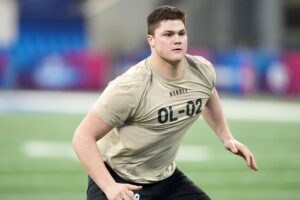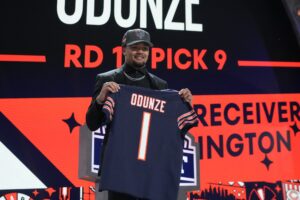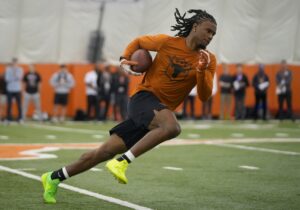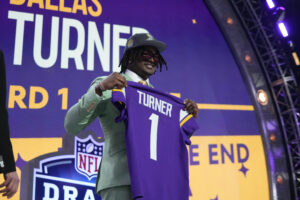Legacy. It’s one of the platitudes most commonly utilized when discussing an NFL quarterback’s impact on the sport. Football fans and media members alike spend hours of time discussing, analyzing, and dissecting this particular matter. In the eyes of many, Tom Brady just solidified his legacy as the greatest of all time with his fifth Super Bowl victory. Peyton Manning‘s legacy was questioned and deemed incomplete for years before he ultimately won his second title in Super Bowl XL. Dan Marino, one of the most talented and prolific passers to ever play the game, frequently has his legacy questioned because he never hoisted the Lombardi trophy.
So then, what is the legacy of Los Angeles Chargers quarterback Philip Rivers? After 13 seasons in the league, Rivers has yet to win the big one, despite producing stretches of statistical brilliance and compiling a veritable laundry list of heroic performances. As a new chapter opens in Chargers history, many issues remain for this organization, but nothing lingers more prominently than questions about the legacy of the franchise player.
The Incomparable Legacy of Philip Rivers
So what is Rivers’ place, not just in today’s NFL, but in the annals of the league’s history? At the end of the day, what does he mean to this sport? Indeed, for much of the last decade there has been a general lack of consensus about his positioning among the game’s elite passers. Many pundits laud him as one of the very best in the NFL, while others point out his 4-5 post-season record and occasional late-game meltdowns as a means to discredit him.
Some will argue that he throws too many interceptions. Some will point to the fact that he didn’t win a Super Bowl with players like 2017 Hall of Famer LaDainian Tomlinson and certain future Hall of Famer Antonio Gates around him. Many will have harsh words about his fiery and occasionally abrasive on-field displays, or his quirky shot-put style throwing motion. There might even be a comment or two about his affinity for bolo ties (okay, probably not that last one).
But why? Why is Rivers so harshly critiqued while so many other passers who have accomplished so much less are given a seemingly free pass. The reasons are numerous, but the most common culprit has to do with where his NFL career began.
Peer Pressure
Working against Rivers is the fact that he was part of the 2004 NFL Draft, which also included Eli Manning and Ben Roethlisberger. These three franchise players would go on to form one of the greatest quarterback classes in the league’s illustrious history. In fact, in the minds of many analysts, the collection of passers in the 2004 selection extravaganza was second only to the class of 1983 that featured John Elway, Jim Kelly, and the aforementioned Marino. So why should that hurt Rivers, you ask?
In sports, more often than not, greatness is judged by what a comparable player in a similar era is doing. One needn’t look any further than the last 15 years of NFL lore for proof of this. Tom Brady and Peyton Manning have spent their entire careers being compared to one another. The media blitz that occurred whenever these two faced off (which was quite often) was overwhelming. Manning’s retirement in March of 2016 may have ended the year-to-year debates, but the long-term argument will always rage on.
Of course, this tradition is not just exclusive to football. Arnold Palmer and Jack Nicklaus are two of the all-time greatest golfers, and they were subjected to this same situation for years. Ditto for current hockey phenoms like Sidney Crosby and Alexander Ovechkin. Ultimately, the point of all this is that Philip Rivers’ career will always be linked to those of Eli Manning and Ben Roethlisberger.
This is particularly true of Manning. After making it very clear that he had no interest in playing for the (then) San Diego Chargers, the team went ahead and drafted him with the first overall pick anyway. The pained expression on Manning’s face as he held up his Chargers jersey on stage was evident, and it was clear that this situation was never going to work out for any of the parties involved. Shortly thereafter, a deal was consummated between the Chargers and the New York Giants. The Giants took Rivers with their fourth overall selection, and the two teams swapped quarterbacks, with the Giants throwing in a 2004 third-round pick, as well as 2005 first and fifth-rounders.
It wasn’t an ideal start to Rivers’ NFL career. Spending approximately fifteen minutes as a member of one team before being traded to another, along with an abundance of draft picks no less, for another player at the exact same position probably wasn’t what the former N.C. State star had envisioned for his draft day experience. The trade would go on to become one of the most famous draft deals in league history, and would forever link the careers of Rivers and Manning. Shortly thereafter, Roethlisberger was drafted by the Pittsburgh Steelers with the 11th overall selection, and ever since that moment, these three men have been at the center of countless debates.
Of course, Manning and Roethlisberger have gone on to win two Super Bowls each, for the Giants and Steelers respectively, and Rivers is still seeking his first Lombardi. Whether or not Super Bowl victories should be the measuring stick of quarterback greatness is one of the most hotly debated topics around the league, and one that is highly unlikely to produce consensus any time soon. Fairly or unfairly, this often seems to be the sole criterion used for any comparison between these players. This seems short-sighted, especially when one considers how different each player’s situation was upon entering the league.
Manning took over from Kurt Warner as the starting quarterback of the New York Giants in Week Ten of his rookie season. Roethlisberger made his first start as a rookie even sooner. After playing well in relief of Tommy Maddox in Week Three, he was given the job full-time the following week. For Rivers, it was a much longer and arduous path to the starting lineup. In fact, he spent two full season sitting on the bench behind Drew Brees, before finally making his first start on opening weekend in 2006 after Brees departed for New Orleans.
What this means, more or less, is that at the height of the Chargers’ window of Super Bowl contention, Rivers was either on the bench or in his first couple of seasons as a starter. It’s not fair to judge what he accomplished in 2006 and 2007 the same way you would judge what Manning and Roethlisberger were doing at the same time. For all intents and purposes, they were veterans before he ever stepped onto the field. It’s not Rivers’ fault that he had the most difficult path to playing time of any of the three young signal callers. The Chargers simply couldn’t take Brees out of the lineup in the midst of his breakout. What is undeniable, however, is what River accomplished once he was finally handed the reins.
By the Numbers
In spite of the fact that Manning and Roethlisberger had made 23 and 25 starts, respectively, before he made his first, Rivers’ counting career statistics approach or supersede those of his two peers. Furthermore, his yearly average numbers blow them both out of the water. Rivers’ statistical brilliance as an NFL signal caller is simply undeniable. Since taking over as the starter in 2006, he has produced some of the best totals in league history.
Philip Rivers is currently 12th all time in passing yardage, 8th all time in passing TDs, 8th in all time passer rating…
— Benjamin Allbright (@AllbrightNFL) December 21, 2016
One can handpick virtually any career passing metric imaginable, and Rivers ranks near the top of the list. In fact, his 45,833 passing yards rank 12th all-time, his 314 touchdown passes and 94.7 passer rating both rank eighth all-time, and his 254.6 pass yards per game, 3,811 completions, and 64.4 completion percentage all rank 10th all-time. Furthermore, Rivers has 97 regular season wins, and has been selected to six Pro Bowls.
But nothing is more impressive than his durability.
Iron Man
In 11 seasons as the Chargers’ starting quarterback, Rivers has never missed a game. Not one. That amounts to 176 regular season games and nine playoff contests, good for a total of 185 consecutive starts. That is the fourth-longest tally in league history, and the second-longest active streak, only behind Eli Manning’s 199 (this is becoming a theme).
While there are many examples of Rivers’ remarkable durability, none stands out more than one particular afternoon in Foxborough. It was January 20th, 2008, and the Chargers faced the New England Patriots in the AFC Championship game. The Patriots were firmly in the midst of pursuing a 19-0 season, and a win over the Chargers would place them one game away from history. What ensued was a 21-12 New England victory; a relatively sloppy affair that saw the Patriots pick up their 18th win of the season, before ultimately losing the Super Bowl to the New York Giants, thanks in large part to the heroics of…. Eli Manning (Rivers just cannot escape him).
But, at the risk of digressing from what is truly important here, back to Rivers. A simple glance at the AFC Championship game’s stat sheet would indicate that he played poorly. Completing only 19 of 37 passes, for 211 yards, with no touchdowns passes and two interceptions would appear to be an ugly performance for any quarterback, let alone one of his caliber. Indeed that’s true, but those numbers don’t tell anywhere near the whole story.
Philip Rivers played that game with a torn ACL.
That’s right, an NFL quarterback played through a game with a torn ACL. Not a sore shoulder. Not a sprained ankle. Not turf toe. A torn ACL. You can question if that was a wise decision on Rivers’ part, but you absolutely cannot question his toughness and heart. Going toe-to-toe with one of the best teams in league history at their hungriest and most ferocious, when he was essentially playing on one leg? Unbelievable. It was one of the absolute gutsiest displays in NFL history, and the perfect snapshot of who Rivers is as a player and a person.
Over the course of his professional career, Rivers has started in nine playoff games, but that trip to the AFC Championship is the closest he has come to a Super Bowl appearance. Since that remarkable day, the Chargers organization has endured it’s fair share of ups and downs. While the franchise has made the post-season three more times since then, they have seldom been perceived as a threat in the AFC, with the notable exception of the 2009 squad that finished 13-3. So what does the future hold for Rivers and this team?
New City, New Coach
For starters, the Chargers franchise has gone through an extreme makeover this off-season. After spending his entire career in San Diego, Rivers finds himself on the move for the first time. While it might not be to a new team, as many had anticipated in the past, he now finds himself in a new city. Rivers had been on the fence about his willingness to uproot his family in order to be a part of the Chargers’ Los Angeles relocation plan, but in the aftermath of the team’s sudden move, he has made it clear that he’s on board and ready to get back to the business of playing football.
Changes on the field loom large as well, as Rivers will enter the 2017 season with the fourth coach of his NFL career. After disappointing 4-12 and 5-11 finishes in 2015 and 2016 respectively, the Chargers decided to shake up their staff, with former Buffalo Bills offensive coordinator Anthony Lynn taking over as the team’s head coach. Lynn was viewed as one of this off-season’s most promising coaching candidates and is bringing former Jacksonville Jaguars head coach Gus Bradley into the mix as his defensive coordinator.
Perhaps the most important move to Rivers, however, was the change the team didn’t make. In the midst of all this re-structuring, offensive coordinator Ken Whisenhunt was retained. Whisenhunt is currently in the midst of his second stint with the Chargers, and he has done some great work with Rivers in the past. Keeping these two together is likely a smart move for the team’s immediate future, and the preservation of the offense’s continuity will unquestionably prove beneficial to Rivers.
New Hope
The 2015 and 2016 Chargers teams were never as bad as their records indicated. They were always a few plays and a couple avoided injuries away from being competitive. There is a reason, after all, that only three of Rivers’ seasons as the starter have produced sub-.500 finishes. This team has more than enough talent in place to be competitive in 2017, and in fact, Rivers finds himself with one of the best offensive supporting casts he’s had in his career.
For starters, he will have his top target Keenan Allen back in the mix. When healthy, Allen has proven to be one of the league’s better receivers, and is currently on track to return from a torn ACL he sustained in last season’s opening contest. When you add in 2016 breakouts like Pro Bowl running back Melvin Gordon and big-play wideout Tyrell Williams, as well as promising sophomore tight end Hunter Henry, dangerous speedster Travis Benjamin, and the ever-reliable Gates, you have a formula for offensive success. If the Chargers are able to re-sign one or both of pass-catching back Danny Woodhead and dependable restricted free agent Dontrelle Inman, that will be mere icing on an already delicious cake.
With Defensive Rookie of the Year Joey Bosa, Pro Bowl cornerback Casey Hayward, and returning star corner Jason Verrett in the mix, expectations are high for the Chargers stop unit as well. In fact, the hope is that this group can emerge from the middle of the pack and become a top-ten NFL defense. If this happens, it will take an enormous amount of pressure off Rivers and the offense, and eliminate some of the drama that led to several late-game collapses in 2016.
The Whole Picture
While the future looks bright for the Los Angeles Chargers, Rivers is now 35-years-old. To this point, he hasn’t shown any signs of slowing down, but there is little doubt that he’s approaching the back end of his NFL career. In spite of all the gutsy performances and sensational stats, there will always be critics who point to his lack of a Super Bowl win as a means of dismissing his Hall of Fame resume. To do so is to ignore all that he’s accomplished over the years, but ultimately that decision comes down to how the voters feel.
While it may not be a virtual certainty that Rivers will have his own bust in Canton one day, he knows that achieving the one goal that has eluded him for his entire career is the only way to guarantee it. While he doesn’t have an unlimited amount of time to make his Championship dreams come true, the Chargers are built to compete in the AFC much sooner than one might expect. With the bright lights of Los Angeles shining on this franchise now, Rivers will be more visible than he has ever been before, and that’s a good thing for the NFL.
Legacy. All great quarterbacks leave a mark on the game, and earn their place in NFL history. Make no mistake about it, Rivers is one of these greats. For a player who has always gone against the grain and done it his way, he has constantly found success in spite of adversity and undue criticism. Whether it be in the face of injury, organizational chaos, or overwhelming opposition, you can always count on Rivers to show up and give his all.
The fiery demeanor that has drawn the ire of fans and pundits alike is not a sign of Rivers’ brashness, but rather proof of his burning, overwhelming passion for the game he loves, and his commitment to chasing victory no matter what the odds. In a game full of players who want to succeed, Rivers absolutely needs to, and he won’t settle for anything less than his own best. Whether he wins a Super Bowl or not, that will always be the legacy of Philip Rivers.
Main Photo:






